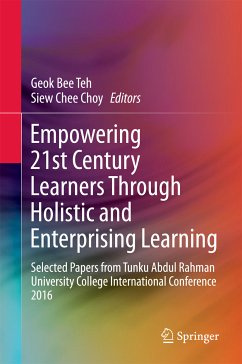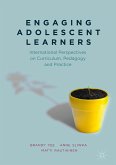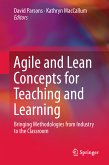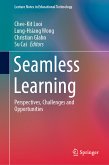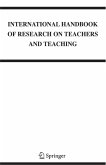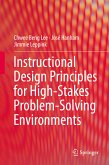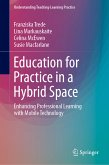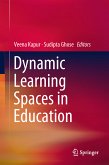Empowering 21st Century Learners Through Holistic and Enterprising Learning (eBook, PDF)
Selected Papers from Tunku Abdul Rahman University College International Conference 2016
Redaktion: Teh, Geok Bee; Choy, Siew Chee
113,95 €
113,95 €
inkl. MwSt.
Sofort per Download lieferbar

57 °P sammeln
113,95 €
Als Download kaufen

113,95 €
inkl. MwSt.
Sofort per Download lieferbar

57 °P sammeln
Jetzt verschenken
Alle Infos zum eBook verschenken
113,95 €
inkl. MwSt.
Sofort per Download lieferbar
Alle Infos zum eBook verschenken

57 °P sammeln
Empowering 21st Century Learners Through Holistic and Enterprising Learning (eBook, PDF)
Selected Papers from Tunku Abdul Rahman University College International Conference 2016
Redaktion: Teh, Geok Bee; Choy, Siew Chee
- Format: PDF
- Merkliste
- Auf die Merkliste
- Bewerten Bewerten
- Teilen
- Produkt teilen
- Produkterinnerung
- Produkterinnerung

Bitte loggen Sie sich zunächst in Ihr Kundenkonto ein oder registrieren Sie sich bei
bücher.de, um das eBook-Abo tolino select nutzen zu können.
Hier können Sie sich einloggen
Hier können Sie sich einloggen
Sie sind bereits eingeloggt. Klicken Sie auf 2. tolino select Abo, um fortzufahren.

Bitte loggen Sie sich zunächst in Ihr Kundenkonto ein oder registrieren Sie sich bei bücher.de, um das eBook-Abo tolino select nutzen zu können.
This book consists of a collection of selected papers presented at the TARC International Conference 2016 held from 17 to 18 October, 2016. It offers a tool for empowering schools and teachers as a way forward for transforming education.
- Geräte: PC
- ohne Kopierschutz
- eBook Hilfe
- Größe: 4.85MB
Andere Kunden interessierten sich auch für
![Engaging Adolescent Learners (eBook, PDF) Engaging Adolescent Learners (eBook, PDF)]() Brandy YeeEngaging Adolescent Learners (eBook, PDF)48,95 €
Brandy YeeEngaging Adolescent Learners (eBook, PDF)48,95 €![Agile and Lean Concepts for Teaching and Learning (eBook, PDF) Agile and Lean Concepts for Teaching and Learning (eBook, PDF)]() Agile and Lean Concepts for Teaching and Learning (eBook, PDF)129,95 €
Agile and Lean Concepts for Teaching and Learning (eBook, PDF)129,95 €![Seamless Learning (eBook, PDF) Seamless Learning (eBook, PDF)]() Seamless Learning (eBook, PDF)121,95 €
Seamless Learning (eBook, PDF)121,95 €![International Handbook of Research on Teachers and Teaching (eBook, PDF) International Handbook of Research on Teachers and Teaching (eBook, PDF)]() International Handbook of Research on Teachers and Teaching (eBook, PDF)718,95 €
International Handbook of Research on Teachers and Teaching (eBook, PDF)718,95 €![Instructional Design Principles for High-Stakes Problem-Solving Environments (eBook, PDF) Instructional Design Principles for High-Stakes Problem-Solving Environments (eBook, PDF)]() Chwee Beng LeeInstructional Design Principles for High-Stakes Problem-Solving Environments (eBook, PDF)40,95 €
Chwee Beng LeeInstructional Design Principles for High-Stakes Problem-Solving Environments (eBook, PDF)40,95 €![Education for Practice in a Hybrid Space (eBook, PDF) Education for Practice in a Hybrid Space (eBook, PDF)]() Franziska TredeEducation for Practice in a Hybrid Space (eBook, PDF)53,95 €
Franziska TredeEducation for Practice in a Hybrid Space (eBook, PDF)53,95 €![Dynamic Learning Spaces in Education (eBook, PDF) Dynamic Learning Spaces in Education (eBook, PDF)]() Dynamic Learning Spaces in Education (eBook, PDF)73,95 €
Dynamic Learning Spaces in Education (eBook, PDF)73,95 €-
-
-
This book consists of a collection of selected papers presented at the TARC International Conference 2016 held from 17 to 18 October, 2016. It offers a tool for empowering schools and teachers as a way forward for transforming education.
Hinweis: Dieser Artikel kann nur an eine deutsche Lieferadresse ausgeliefert werden.
Dieser Download kann aus rechtlichen Gründen nur mit Rechnungsadresse in A, B, BG, CY, CZ, D, DK, EW, E, FIN, F, GR, HR, H, IRL, I, LT, L, LR, M, NL, PL, P, R, S, SLO, SK ausgeliefert werden.
Hinweis: Dieser Artikel kann nur an eine deutsche Lieferadresse ausgeliefert werden.
Produktdetails
- Produktdetails
- Verlag: Springer Nature Singapore
- Seitenzahl: 267
- Erscheinungstermin: 8. April 2017
- Englisch
- ISBN-13: 9789811042416
- Artikelnr.: 53059354
- Verlag: Springer Nature Singapore
- Seitenzahl: 267
- Erscheinungstermin: 8. April 2017
- Englisch
- ISBN-13: 9789811042416
- Artikelnr.: 53059354
- Herstellerkennzeichnung Die Herstellerinformationen sind derzeit nicht verfügbar.
Dr. Geok Bee Teh is a chemist specialised in chemical education and nanoparticles research. She holds a PhD and M.Phil. in Chemistry from University of Cambridge, United Kingdom and a 1st Class Bachelor Honours degree from National University of Malaysia. Dr. Siew Chee Choy has 20 years of teaching experience in USA and Malaysia. She assume the position of Head of Perak Branch of Tunku Abdul Rahman University College, a positon held since 1997. She obtained a PhD in Education from the University of Exeter, UK, and a MEd (Science Education and Guidance & Counselling) and BSc (Chemistry & Biology) from Campbell University, USA.
Preface: Proceedings of the TARC International Conference 2016.- Introduction to Proceedings.- Contents.- Part I: Globalised Online Learning.- Chapter 1. Students' Satisfaction towards Online Learning Systems: Assessing its Internal and External Factors.- Chapter 2. Embedding Digital Literacies in Curricula: Australian and Malaysian Experiences.- Chapter 3. Better Assessment Through Video: The Development of An Assessment Productivity App.-Chapter 4. Using Technology Acceptance Model to examine the usage of information and communications technology among Nursing Students.- Chapter 5. Awareness of Safe and Responsible Use of ICT among students in a Malaysian University.- Chapter 6. Initial Considerations for Transnational Education Providers Regarding the Mapping of the East African Qualifications Framework to the European Qualifications Framework.- Part II: Methodologies and Strategies for Holistic and Enterprising Learning.- Chapter 1. How and Why Malaysian Hospitality and Tourism Management Students Learn.- Chapter 2. Effectiveness of Cooperative Learning in Developing Linguistic Competence of College Students. Chapter 3. The Mediating Role of Learners' Awareness on Malaysian and American Students' Approaches to Learning.- Chapter 4. The Effects of Task Demand and External Stimuli on Learner's Stress Perception and Job Performance.- Chapter 5. How Does Inquiry-Based Instruction Affect Learning In A Secondary School Science Class?.- Chapter 6. Effectiveness of Cooperative Learning Approach in Developing Critical Thinking Skills of Secondary Students.- Chapter 7. Developing Effective Cultures of Student Partnership in Higher Education.- Chapter 8. Expression of Male & Female Forms in Anthropomorphic Entities for Application in Educational Robotics: A Pilot Study.-Part III Curriculum Enhancement and Pedagogical Models.- Chapter 1. Cynicism Toward Educational Change on Teacher Satisfaction: The Contribution of Situational and Dispositional Attribution.- Chapter 2. Exploring the Impact of International Student Mobility on Cross-cultural Learning Adaptation.- Chapter 3 . The Use of Online Videos to Support Mathematics Education for Pre-Service Educators: How Much "Face" Should I Show?.- Chapter 4. Diagnosing Higher Education on Purposefulness: Introducing the Employability Development and Assessment Maturity Model (EDAMM).-Chapter 5. Examination of the Cross Disciplinary Connection and Cross Disciplinary Integration of ESL and Music Pedagogies.- Chapter 6. Quality Control in Physical Education in Malaysia: Relooking at the National Strategy for Quality Physical Education.- Chapter 7. Higher Education Policy Governing the Future Vocational Skills Development in the Hospitality Sector - An Example from Ireland.- Chapter 8. Developing Digital Pedagogy: The Impact of National Strategy and Enhancement Themes in an Irish Institute of Higher Education.- Chapter 9. Analysis of Course Content Structure and Critical Thinking in Strategic Management.- Chapter 10. Micro-Learning - Adopting Digital Pedagogies to Facilitate Technology Enhanced Teaching and Learning for CPD.- Chapter 11. Governance Practices and Disclosure by Not-for-Profit Organisations: Effect on the Individual Donating Decision.- Chapter 12. Developing a Framework for Postgraduate Supervision.- Index.
Preface: Proceedings of the TARC International Conference 2016.- Introduction to Proceedings.- Contents.- Part I: Globalised Online Learning.- Chapter 1. Students' Satisfaction towards Online Learning Systems: Assessing its Internal and External Factors.- Chapter 2. Embedding Digital Literacies in Curricula: Australian and Malaysian Experiences.- Chapter 3. Better Assessment Through Video: The Development of An Assessment Productivity App.-Chapter 4. Using Technology Acceptance Model to examine the usage of information and communications technology among Nursing Students.- Chapter 5. Awareness of Safe and Responsible Use of ICT among students in a Malaysian University.- Chapter 6. Initial Considerations for Transnational Education Providers Regarding the Mapping of the East African Qualifications Framework to the European Qualifications Framework.- Part II: Methodologies and Strategies for Holistic and Enterprising Learning.- Chapter 1. How and Why Malaysian Hospitality and Tourism Management Students Learn.- Chapter 2. Effectiveness of Cooperative Learning in Developing Linguistic Competence of College Students. Chapter 3. The Mediating Role of Learners' Awareness on Malaysian and American Students' Approaches to Learning.- Chapter 4. The Effects of Task Demand and External Stimuli on Learner's Stress Perception and Job Performance.- Chapter 5. How Does Inquiry-Based Instruction Affect Learning In A Secondary School Science Class?.- Chapter 6. Effectiveness of Cooperative Learning Approach in Developing Critical Thinking Skills of Secondary Students.- Chapter 7. Developing Effective Cultures of Student Partnership in Higher Education.- Chapter 8. Expression of Male & Female Forms in Anthropomorphic Entities for Application in Educational Robotics: A Pilot Study.-Part III Curriculum Enhancement and Pedagogical Models.- Chapter 1. Cynicism Toward Educational Change on Teacher Satisfaction: The Contribution of Situational and Dispositional Attribution.- Chapter 2. Exploring the Impact of International Student Mobility on Cross-cultural Learning Adaptation.- Chapter 3 . The Use of Online Videos to Support Mathematics Education for Pre-Service Educators: How Much "Face" Should I Show?.- Chapter 4. Diagnosing Higher Education on Purposefulness: Introducing the Employability Development and Assessment Maturity Model (EDAMM).-Chapter 5. Examination of the Cross Disciplinary Connection and Cross Disciplinary Integration of ESL and Music Pedagogies.- Chapter 6. Quality Control in Physical Education in Malaysia: Relooking at the National Strategy for Quality Physical Education.- Chapter 7. Higher Education Policy Governing the Future Vocational Skills Development in the Hospitality Sector - An Example from Ireland.- Chapter 8. Developing Digital Pedagogy: The Impact of National Strategy and Enhancement Themes in an Irish Institute of Higher Education.- Chapter 9. Analysis of Course Content Structure and Critical Thinking in Strategic Management.- Chapter 10. Micro-Learning - Adopting Digital Pedagogies to Facilitate Technology Enhanced Teaching and Learning for CPD.- Chapter 11. Governance Practices and Disclosure by Not-for-Profit Organisations: Effect on the Individual Donating Decision.- Chapter 12. Developing a Framework for Postgraduate Supervision.- Index.
